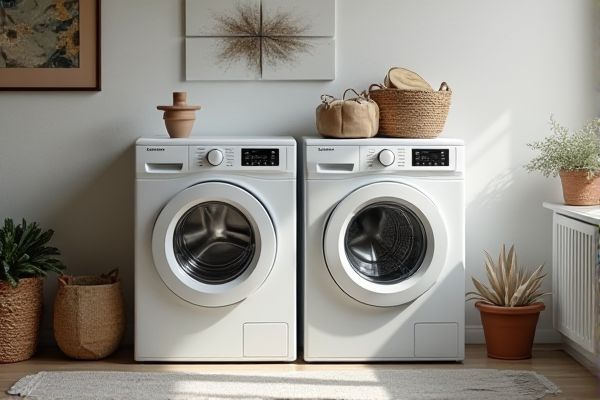
A smart washer offers advanced features like Wi-Fi connectivity, remote control via smartphone apps, and energy-efficient cycles, enhancing convenience and customization compared to a regular washer. Discover how these technological upgrades can transform your laundry routine by reading the rest of the article.
Table of Comparison
| Feature | Smart Washer | Regular Washer |
|---|---|---|
| Connectivity | Wi-Fi enabled, mobile app control | No connectivity, manual operation |
| Energy Efficiency | High efficiency, adaptive cycles | Standard efficiency |
| Cycle Customization | Customizable via app with AI suggestions | Preset cycles, limited options |
| Maintenance Alerts | Automatic malfunction and maintenance notifications | No alerts, manual checks needed |
| Cost | Higher initial investment | Lower upfront cost |
| Installation | Requires smart home integration | Standard installation |
| User Interface | Touchscreen and app-based controls | Physical buttons and dials |
Introduction to Smart Washers and Regular Washers
Smart washers incorporate advanced technology such as Wi-Fi connectivity, touchscreen controls, and sensors that optimize water usage and cycle settings for enhanced efficiency. Regular washers operate with basic mechanical or electronic controls, relying on preset cycles without real-time adjustments or remote monitoring capabilities. The integration of smart features in washers offers improved convenience, energy savings, and customized washing experiences compared to traditional models.
Key Features of Smart Washers
Smart washers feature advanced technologies such as Wi-Fi connectivity, allowing remote control and monitoring via smartphone apps, and often include sensor-based load detection for optimized water and energy use. These washers provide customizable wash cycles, voice command compatibility, and integration with smart home systems, improving convenience and efficiency. Regular washers lack these intelligent functionalities, relying on manual settings and timers without connectivity or adaptive performance enhancements.
Key Features of Regular Washers
Regular washers offer essential cleaning functions with various cycle options, such as normal, delicate, and heavy-duty, designed to handle different fabric types and soil levels. They feature straightforward controls, usually mechanical dials or basic digital panels, providing ease of use and reliability without complex technology. Your choice of a regular washer ensures a cost-effective and durable solution for everyday laundry needs without the need for advanced connectivity or smart diagnostics.
Smart Washer Technology and Connectivity
Smart washers feature advanced technology such as IoT integration, allowing remote control and monitoring via smartphone apps, which enhances user convenience and energy efficiency. These machines utilize sensors to optimize water usage, detergent levels, and wash cycles based on fabric type and soil level, reducing waste and improving cleaning performance. Connectivity features include Wi-Fi, voice assistant compatibility, and real-time notifications, setting smart washers apart from regular washers that lack these intelligent control and automation capabilities.
Energy Efficiency Comparison
Smart washers utilize advanced sensors and adaptive cycles to optimize water and energy usage, significantly reducing consumption compared to regular washers that operate on fixed settings. These intelligent machines adjust to load size and fabric type, which enhances energy efficiency and lowers utility bills. Your choice of a smart washer can lead to substantial savings and a greener household footprint over time.
Cost Differences and Value for Money
Smart washers typically cost between $800 and $1,500, while regular washers range from $400 to $900, reflecting a significant price gap due to advanced features like Wi-Fi connectivity and AI-driven wash cycles. Despite the higher upfront cost, smart washers offer improved energy efficiency and tailored washing programs that can reduce long-term utility bills and enhance fabric care. Consumers seeking value for money should weigh the premium price against potential savings and convenience, especially in households with frequent laundry needs.
User Experience and Convenience
Smart washers enhance user experience by offering remote control via smartphone apps, allowing you to start, pause, or monitor cycles from anywhere. Features such as automatic detergent dispensing and customizable wash cycles provide tailored cleaning, reducing manual effort and saving time. In contrast, regular washers rely on manual settings and physical controls, limiting convenience and interaction flexibility.
Maintenance and Troubleshooting
Smart washers feature advanced self-diagnosis systems that notify you of maintenance needs and potential issues through mobile apps, reducing downtime and costly repairs. Regular washers rely on manual inspection and often require professional service for troubleshooting, which can delay problem resolution. Your maintenance efforts are streamlined with smart washers, as they offer automated alerts for filter cleaning, detergent refills, and part replacements, enhancing washer longevity and performance.
Environmental Impact
Smart washers use advanced sensors and eco-friendly cycles to minimize water and energy consumption, reducing your household carbon footprint more effectively than regular washers. They optimize detergent usage and cycle times, preventing waste and lowering environmental impact over time. Investing in a smart washer supports sustainable laundry habits by conserving resources without sacrificing cleaning performance.
Which Washer is Best for Your Home?
Smart washers offer advanced features like Wi-Fi connectivity, remote control via smartphone apps, and energy-efficient cycles that adapt to load size, making them ideal for tech-savvy users seeking convenience and utility savings. Regular washers provide reliable, straightforward performance with lower upfront costs, appealing to households prioritizing simplicity and budget-friendly options. Choosing the best washer depends on your lifestyle needs, budget, and preference for smart technology integration versus traditional durability.
 homyna.com
homyna.com